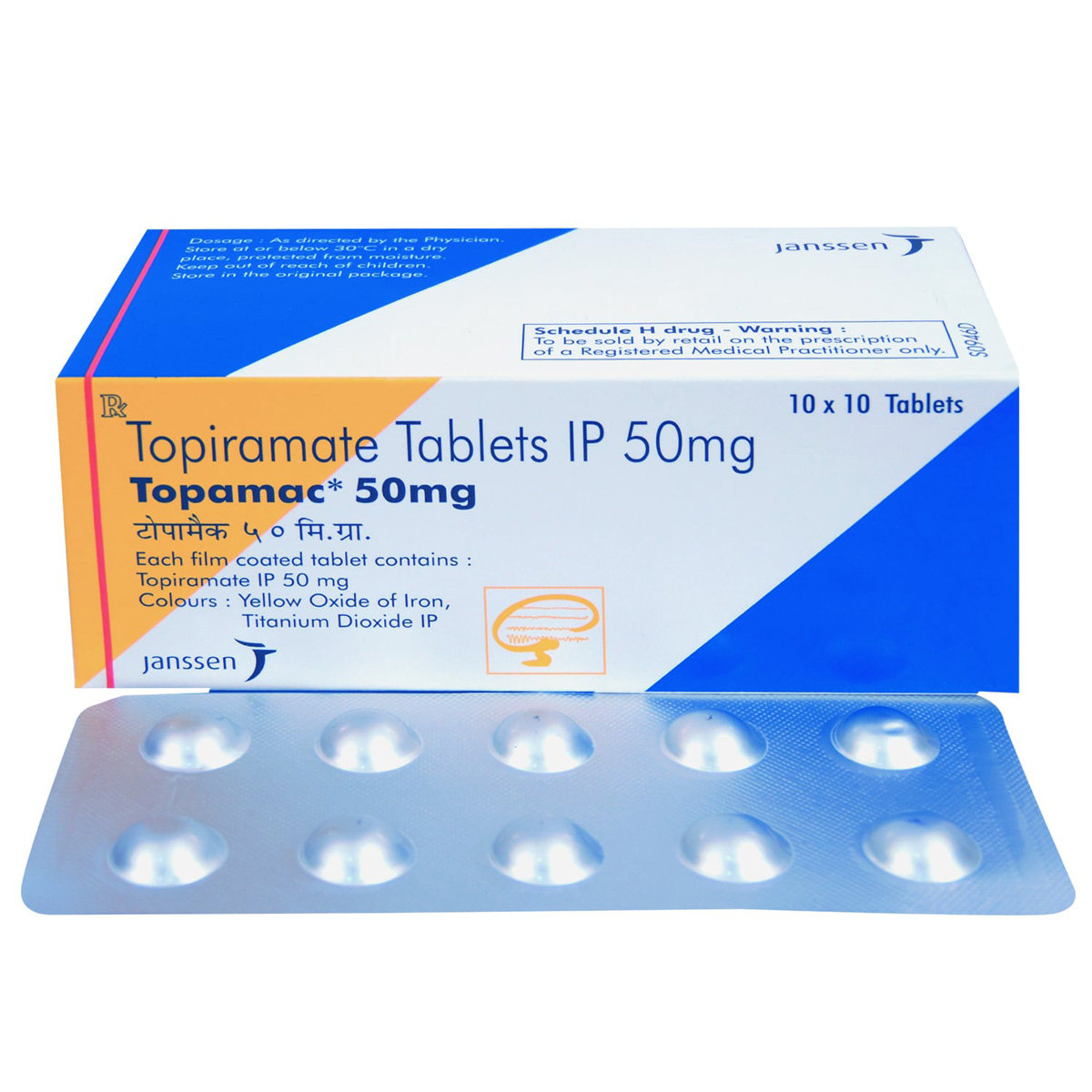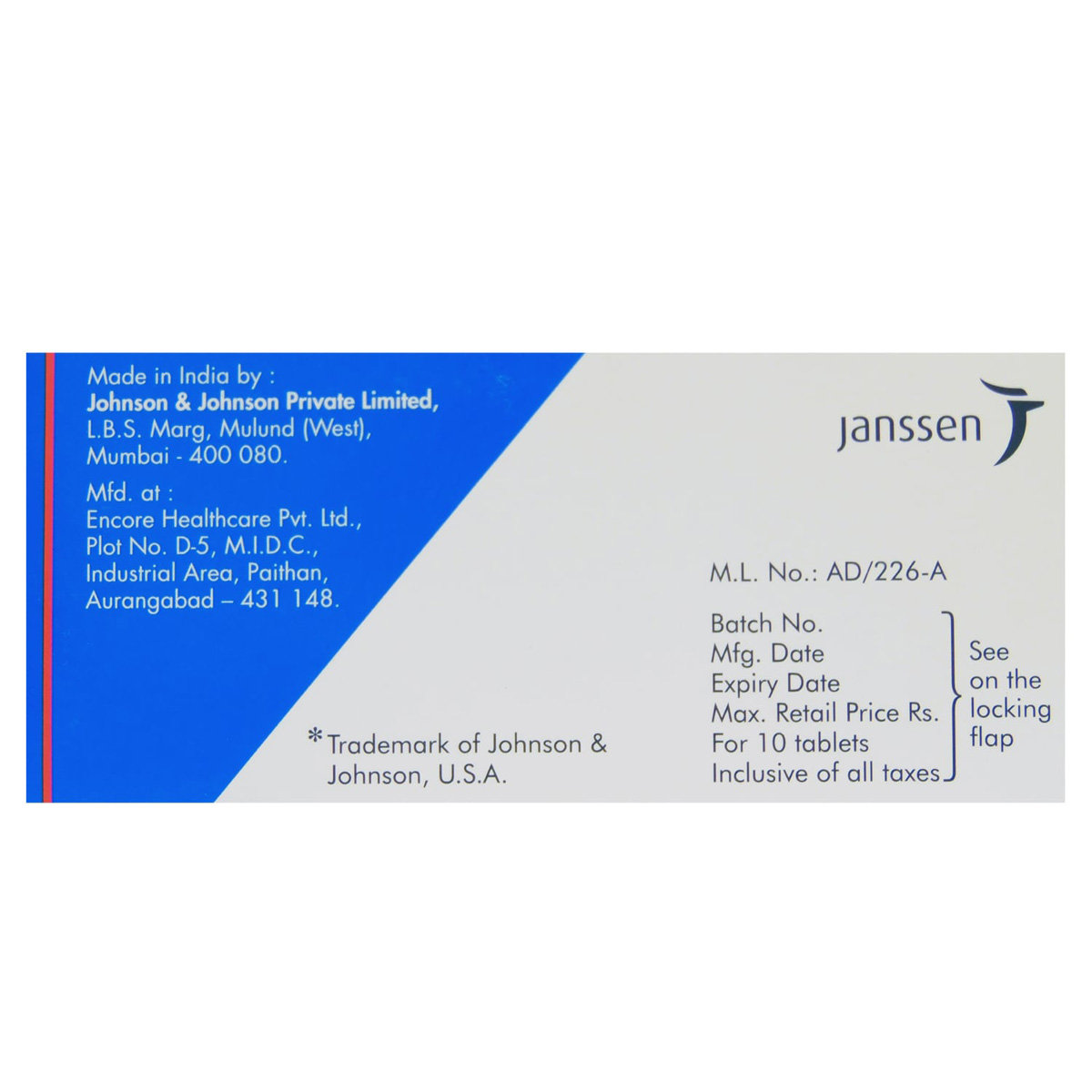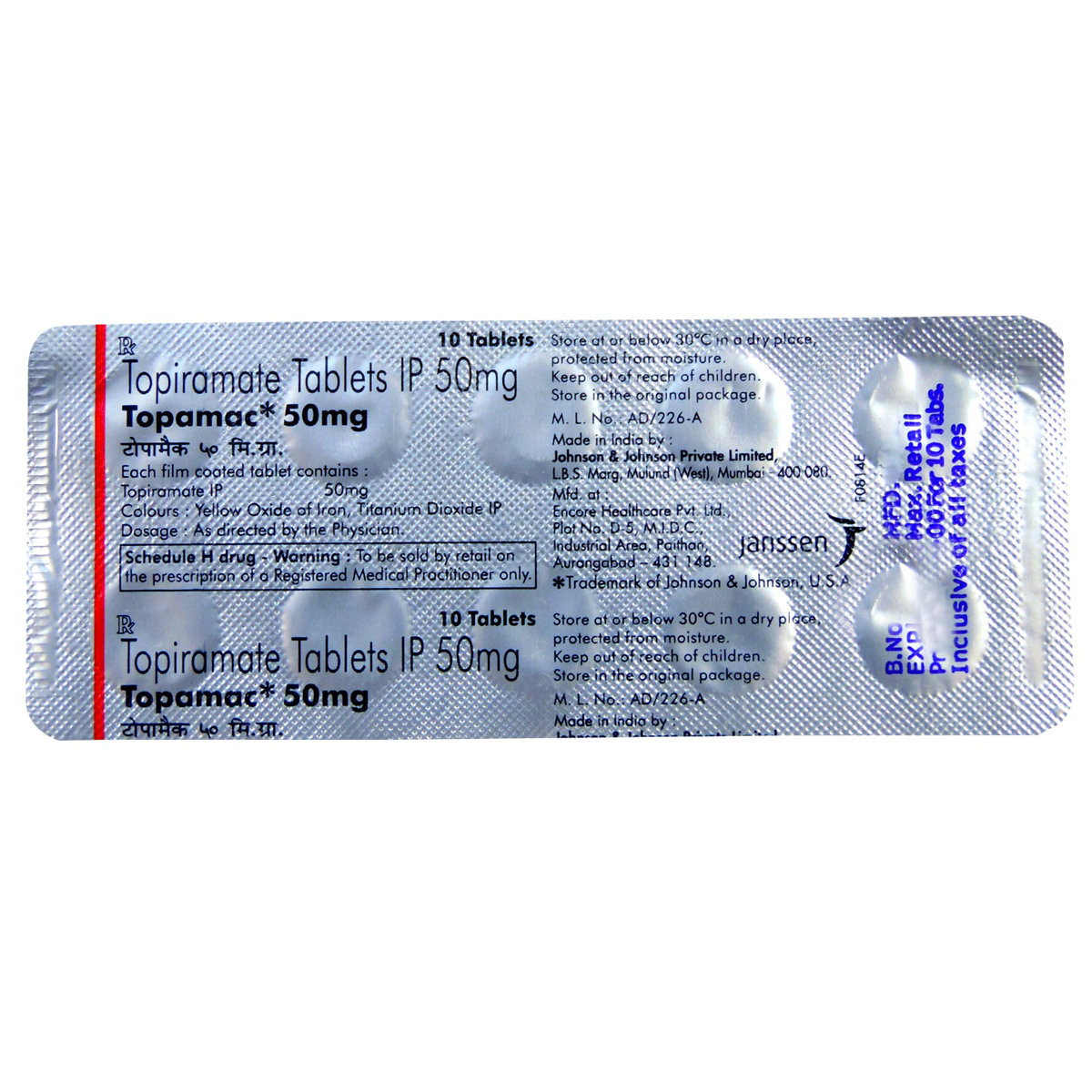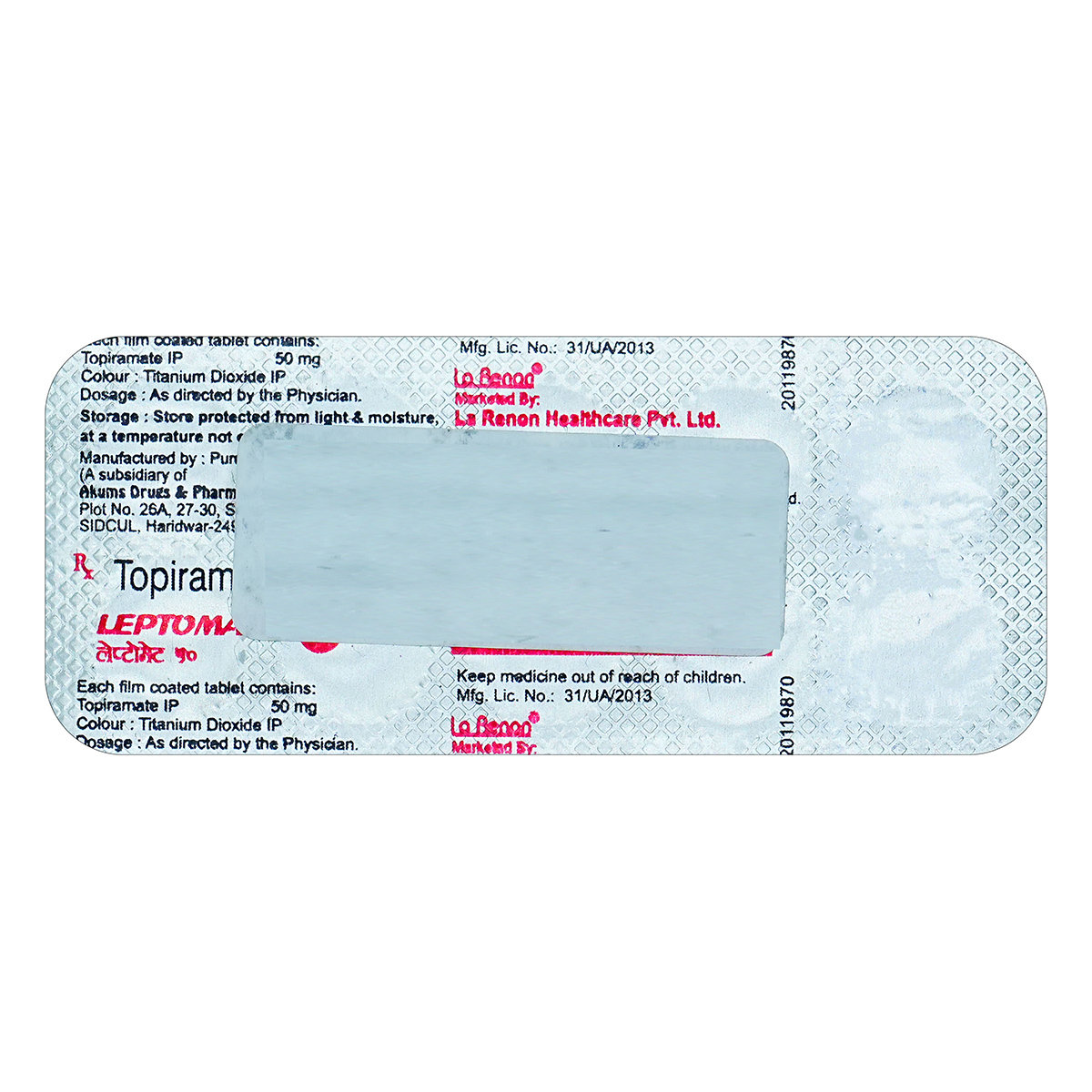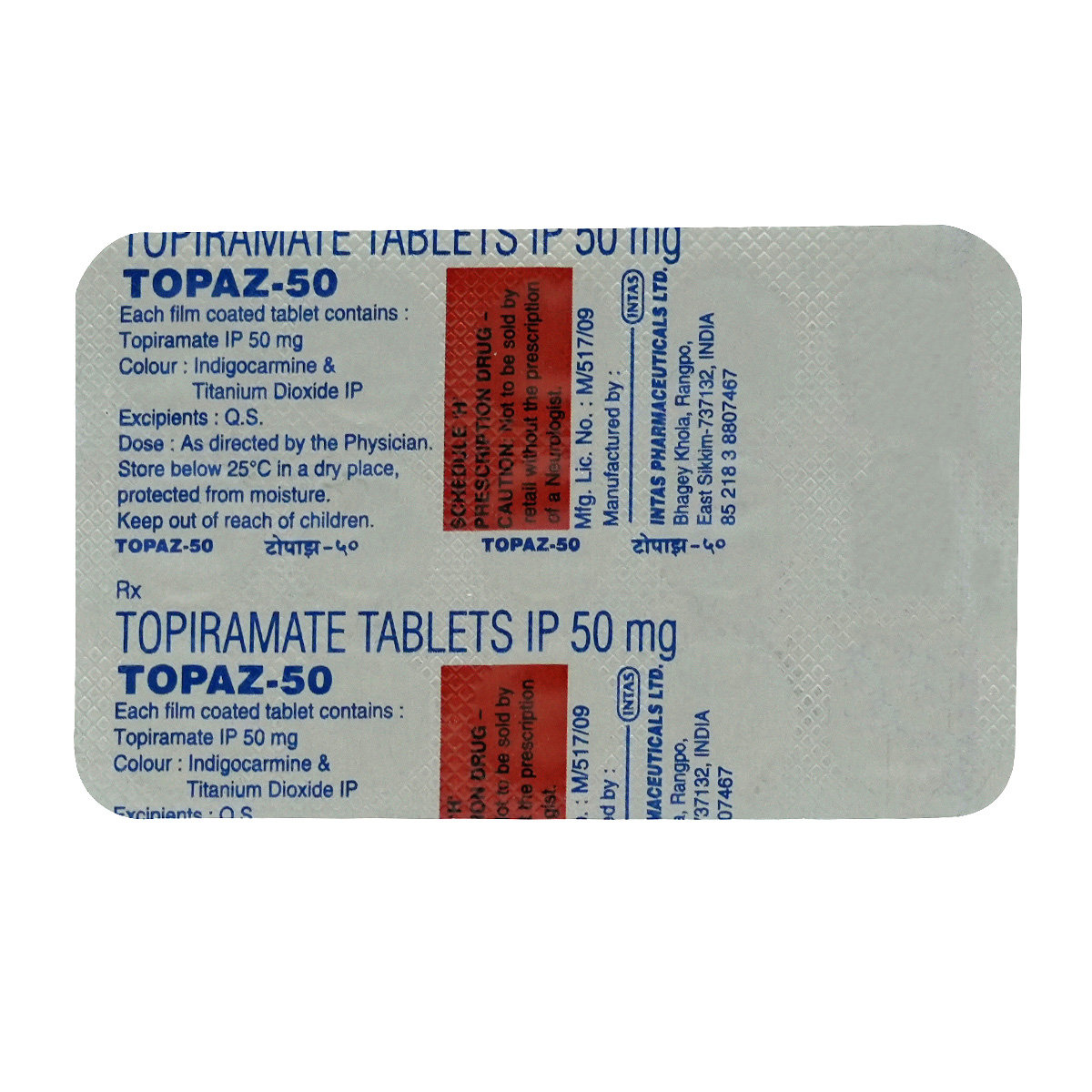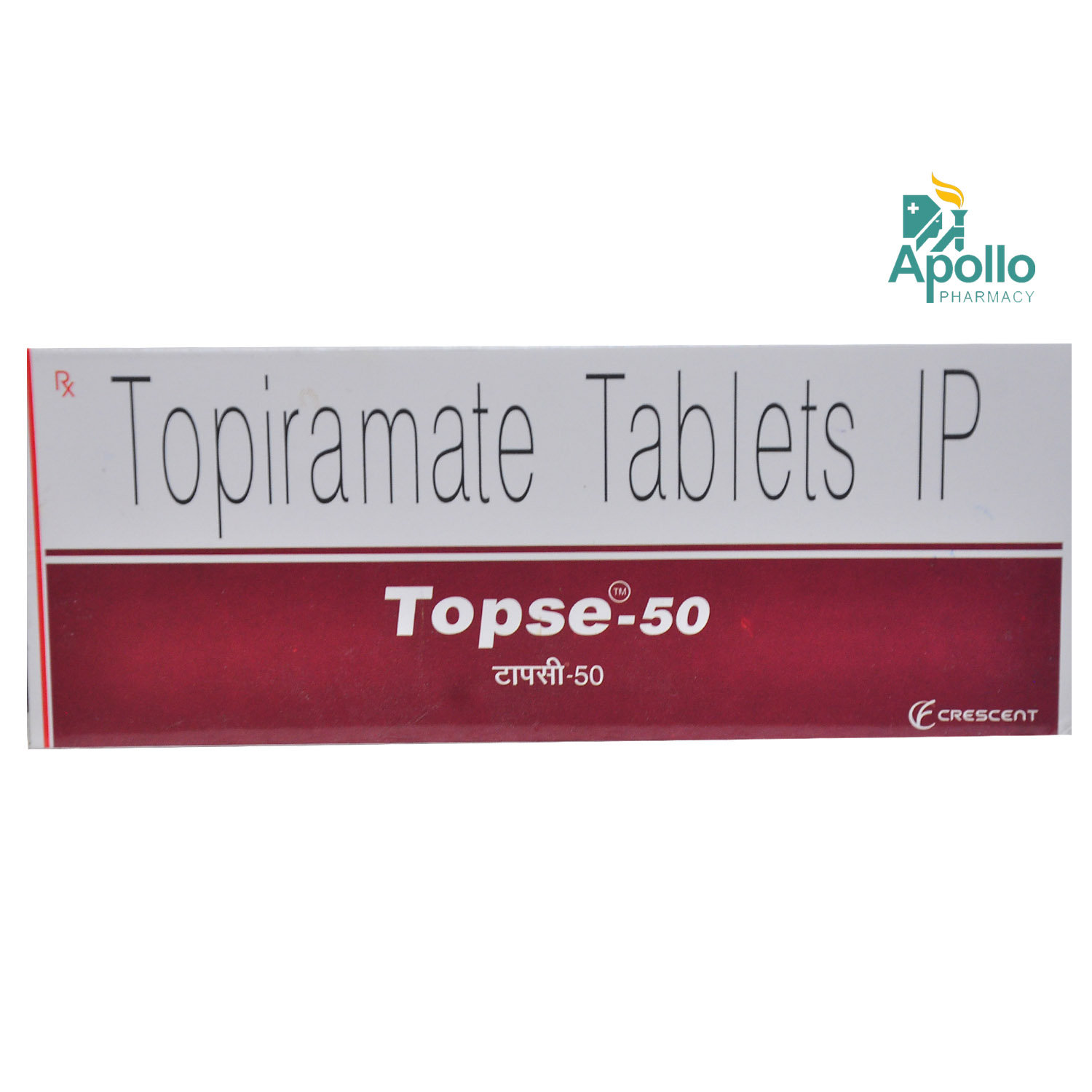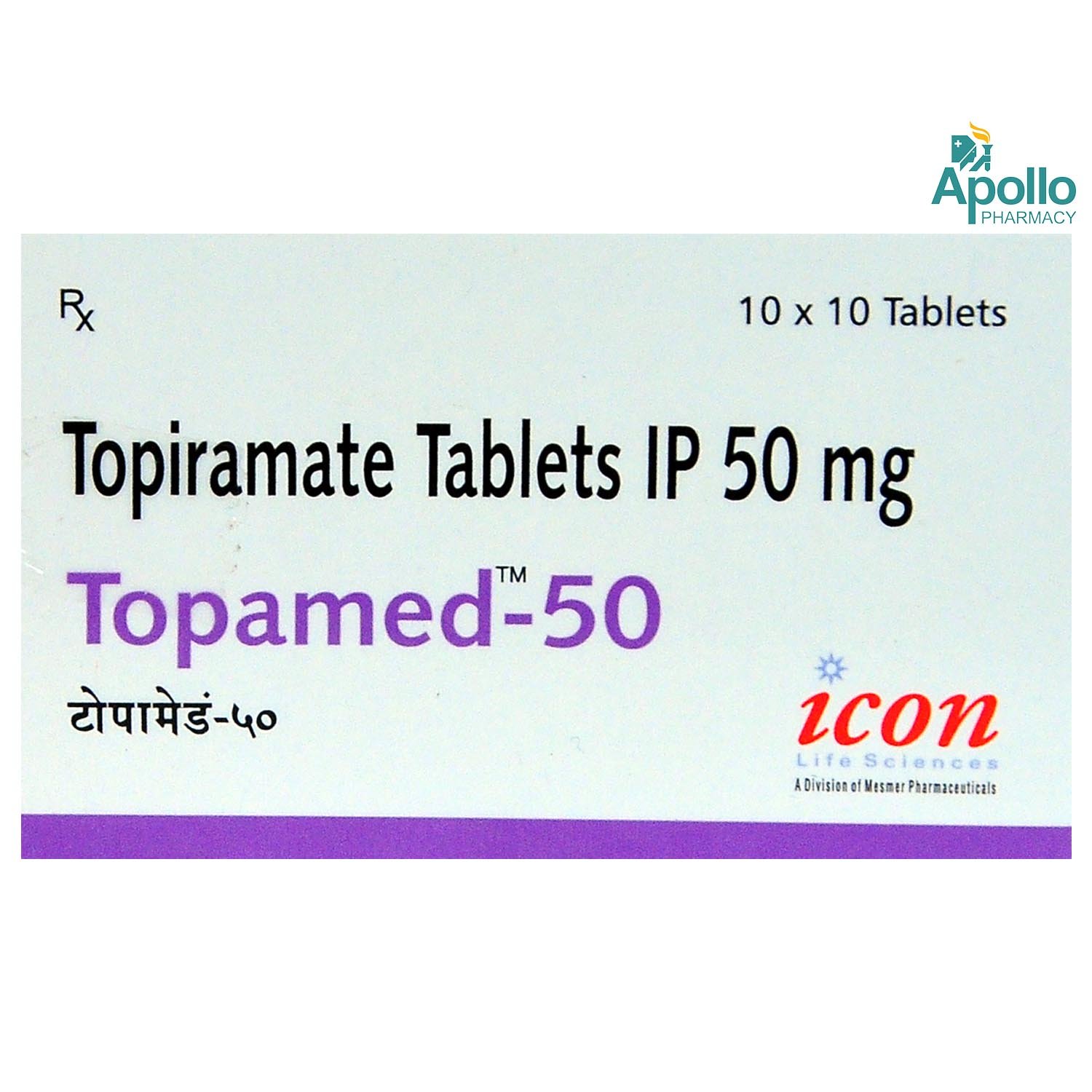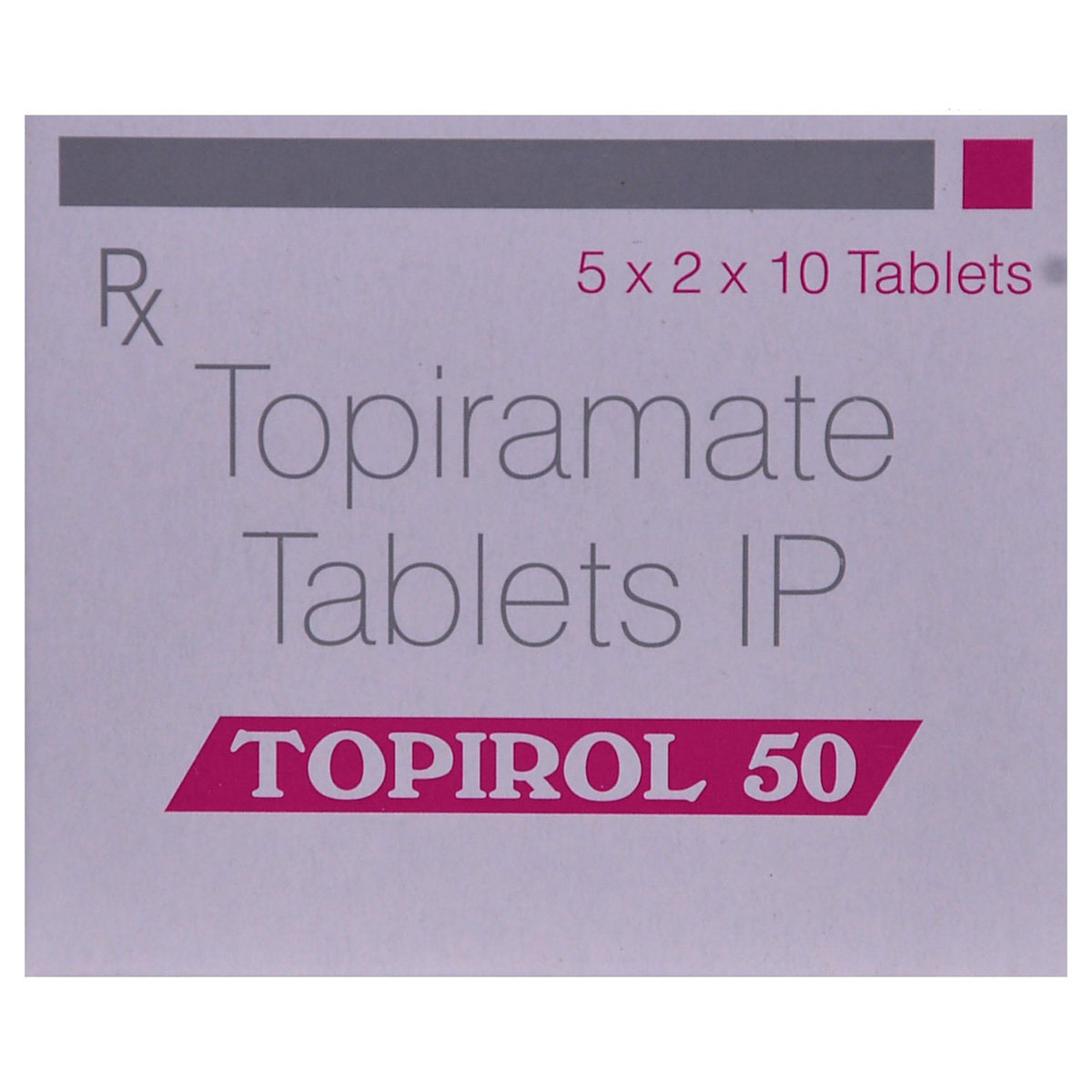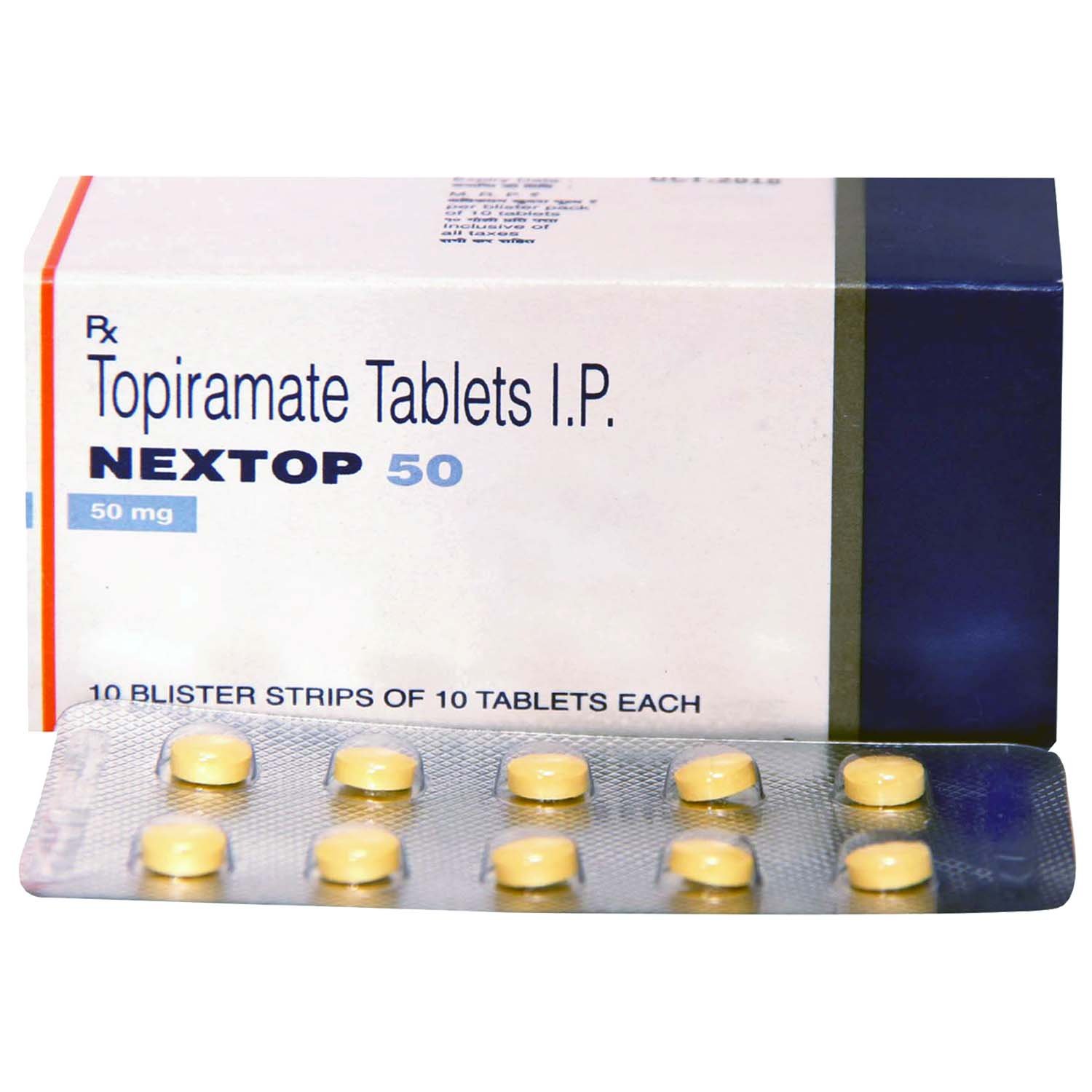Topamac 50 mg Tablet 10's
MRP ₹275
(Inclusive of all Taxes)
₹41.3 Cashback (15%)
Provide Delivery Location
Online payment accepted
 Prescription drug
Prescription drugWhats That
 45 people bought
45 people bought Composition :
Manufacturer/Marketer :
Consume Type :
Expires on or after :
Return Policy :
About Topamac 50 mg Tablet
Topamac 50 mg Tablet belongs to a group of medicines called “antiepileptic (AED)/ anticonvulsant agent' that is primarily indicated in the treatment of epilepsy (Monotherapy and Adjunctive therapy) and It can also be taken to prevent migraine. Epilepsy is a chronic disorder that is responsible for causing unprovoked, recurrent seizures in the body. A seizure is a sudden attack in the brain that makes a person lose control of their actions. Migraine is a mental condition that often causes intense or debilitating headaches with difficulty speaking, nausea, vomiting, and sensitivity to light or sound.
Topamac 50 mg Tablet is responsible for restoring the balance of neural activity by diminishing the spread of seizure movement in the brain. By controlling the electrical activity of the brain, it controls seizures and relieves the symptoms of migraine. Take Topamac 50 mg Tablet in an empty stomach without food with one glass of water. Topamac 50 mg Tablet is only available on prescription. It comes as tablets or capsules intended to be taken by mouth only. Swallow the medication as a whole without crushing or breaking it. Topamac 50 mg Tablet doses are sometimes advised according to the weight of children so the doctor will change the dose if the child gains or lose weight.
The possible side effects of topiramate include feeling sleepy, dizziness, diarrhoea and feeling sick. Some of the side effects do not even require medical attention and these are usually mild and go away by themselves. Consult with the doctor if any of these side effects continue or get worse with time.
The use of $mame is restricted in persons who are hypersensitive to it, so tell your doctor if you have any allergy to any of the chemical constituents present in this medicine. Tell your doctor if you ever had or already dealing with diarrhoea, glaucoma, metabolic acidosis, lung disease, breathing problems, liver disease, a blood disorder called acute porphyria etc. If a woman is pregnant or planning to pregnant then they should tell their doctor as the use of this medicine during pregnancy may increase the risk of cleft lip and/or cleft palate which is a birth defect in the newborn that may develop during early pregnancy.
Uses of Topamac 50 mg Tablet
Directions for Use
Key Benefits
Topamac 50 mg Tablet is an antiepileptic (AED) medicine that is used to treat epilepsy in mono or adjunctive therapy and migraine. In Monotherapy epilepsy, Topamac 50 mg Tablet is suggested for patients above 2 years of age with partial-onset or primary generalized tonic-clonic seizures. In Adjunctive therapy epilepsy, Topamac 50 mg Tablet is suggested in patients of 2 to 16 years of age with partial-onset seizures or primary generalized tonic-clonic seizures while in patients more than 2 years of age, Topamac 50 mg Tablet is suggested in patients with seizures associated with Lennox-Gastaut syndrome (LGS). In migraine, Topamac 50 mg Tablet is suggested for prophylaxis of migraine. Topamac 50 mg Tablet works by blocking the voltage-dependent sodium and calcium channels and increasing the inhibitory actions of GABA. In epilepsy, Topamac 50 mg Tablet controls the uncontrolled activity of nerves in the brain and thus prevents or controls seizures. While in migraine, Topamac 50 mg Tablet tranquilizes the overactive nerve cells in the brain that are responsible for causing migraine.
Storage
- Inform your doctor about dizziness symptoms. They may adjust your medication regimen or prescribe additional medications to manage symptoms.
- Follow your doctor's instructions for taking medication, and take it at the same time every day to minimize dizziness.
- When standing up, do so slowly and carefully to avoid sudden dizziness.
- Avoid making sudden movements, such as turning or bending quickly, which can exacerbate dizziness.
- Drink plenty of water throughout the day to stay hydrated and help alleviate dizziness symptoms.
- If you're feeling dizzy, sit or lie down and rest until the dizziness passes.
- Track when dizziness occurs and any factors that may trigger it, and share this information with your doctor to help manage symptoms.
- Inform Your Doctor: Notify your doctor immediately about your diarrhoea symptoms. This allows them to adjust your medication or provide guidance on managing side effects.
- Stay Hydrated: Drink plenty of fluids to replace lost water and electrolytes. Choose water, clear broth, and electrolyte-rich drinks. Avoid carbonated or caffeinated beverages to effectively rehydrate your body.
- Follow a Bland Diet: Eat easy-to-digest foods to help firm up your stool and settle your stomach. Try incorporating bananas, rice, applesauce, toast, plain crackers, and boiled vegetables into your diet.
- Avoid Trigger Foods: Steer clear of foods that can worsen diarrhoea, such as spicy, fatty, or greasy foods, high-fibre foods, and dairy products (especially if you're lactose intolerant).
- Practice Good Hygiene: Maintain good hygiene to prevent the spread of infection. To stay healthy, wash your hands frequently, clean and disinfect surfaces regularly, and avoid exchanging personal belongings with others.
- Take Anti-Diarrheal Medications: If your doctor advises, anti-diarrheal medications such as loperamide might help manage diarrhoea symptoms. Always follow your doctor's directions.
- Keep track of your diarrhoea symptoms. If they don't get better or worse or are accompanied by severe stomach pain, blood, or dehydration signs (like extreme thirst or dark urine), seek medical help.
- Inform your doctor about the common cold symptoms you're experiencing due to medication.
- Your doctor may adjust your treatment plan, which could include changing your medication, adding new medications, or offering advice on managing your symptoms.
- Practice good hygiene, including frequent handwashing, avoiding close contact with others, and avoiding sharing utensils or personal items.
- Drink plenty of fluids, such as warm water or soup, to help thin out mucus.
- Get plenty of rest and engage in stress-reducing activities to help your body recover. If your symptoms don't subside or worsen, consult your doctor for further guidance.
- Rest well; get enough sleep.
- Eat a balanced diet and drink enough water.
- Manage stress with yoga and meditation.
- Limit alcohol and caffeine.
- Physical activities like walking or jogging might help boost energy and make you feel less tired.
- Change positions or take a break from activity to relieve symptoms.
- Avoid postures that put a lot of pressure on just one area of the body.
- If you have vitamin deficiency, take supplements or change your diet.
- Exercise regularly like cycling, walking or swimming.
- Avoid sitting with your legs crossed.
- Clench and unclench your fists and wiggle your toes.
- Massage the affected area.
- Inform your doctor about your constipation symptoms. They may adjust your medication or advise alternative treatments.
- Stay hydrated by drinking sufficient of water (at least 8-10 glasses a day) to help soften stool and promote bowel movements.
- Increase fibre intake by eating foods high in fibre, such as fruits, whole grains, vegetables and legumes, to help bulk up the stool.
- Establish a bowel routine by trying to go to the bathroom at the same time each day to train your bowels.
- Engaging in regular exercise, like walking or yoga, can support in bowel movement stimulation.
- Consult your doctor if constipation persists, and discuss alternative treatments or adjustments to your medication.
Drug Warnings
Topamac 50 mg Tablet may cause a congenital disability called cleft lip in unborn baby, so the use of this medicine is not allowed in pregnant females. Topamac 50 mg Tablet may increase the body temperature and reduce sweating, so one should report it to the doctor if they are noticing decreased sweating and hot, dry skin. Topamac 50 mg Tablet may enhance the level of acid in the blood so one should tell their doctor if they have irregular heartbeats or loss of hunger. Before taking Topamac 50 mg Tablet , tell the doctor if you have diarrhoea, metabolic acidosis, eye problems, liver disease. Topamac 50 mg Tablet may affect the working of contraceptives that include the combined pill, vaginal ring, patches,progestogen-only contraceptive pill, and emergency contraception. So, one should tell their doctor if they are using any contraceptives to prevent pregnancy.
Drug-Drug Interactions
Drug-Drug Interactions
Login/Sign Up
Taking pheniramine with Topamac 50 mg Tablet can cause increased body temperature and decreased sweating.
How to manage the interaction:
Although there is a interaction between Pheniramine and Topamac 50 mg Tablet, but it can be taken if prescribed by a doctor. However, if you experience drowsiness, dizziness, or lightheadedness contact your doctor immediately. Do not stop using any medications without talking to your doctor.
Topamac 50 mg Tablet can cause increased body temperature and decreased sweating, and these effects may be worsened when combined with medications like clomipramine.
How to manage the interaction:
Although taking Topamac 50 mg Tablet and Clomipramine together can cause an interaction, it can be taken if your doctor has suggested it. Do not stop using any medications without a doctor's advice.
When Pimozide is taken with Topamac 50 mg Tablet, it can cause the body to process Pimozide faster.
How to manage the interaction:
Although taking Pimozide and Topamac 50 mg Tablet together can evidently cause an interaction, it can be taken if your doctor has suggested it. Do not discontinue any medications without consulting your doctor.
The therapeutic efficacy of Topamac 50 mg Tablet can be decreased when used in combination with Azatadine.
How to manage the interaction:
Although there is a possible interaction between Topamac 50 mg Tablet and Azatadine, you can take these medicines together if prescribed by your doctor. Do not stop using any medications without a doctor's advice.
Combining Imipramine with Topamac 50 mg Tablet can increase the risk of overheating and reduced sweating.
How to manage the interaction:
There may be a possibility of interaction between Topamac 50 mg Tablet and Imipramine, but it can be taken if prescribed by a doctor. When taken together, your doctor can recommend other options that won't cause any problems. Just be careful and make sure to keep an eye out for any signs of reduced sweating and high body temperature. Do not discontinue any medications without consulting a doctor.
Using Tolterodine with Topamac 50 mg Tablet can increase body temperature and decreased sweating.
How to manage the interaction:
Although there is an interaction between Tolterodine and Topamac 50 mg Tablet, they can be taken together if prescribed by a doctor. However, consult a doctor if you experience sleepiness, dizziness, or lightheadedness. Do not discontinue any medications without consulting a doctor.
Combining Disopyramide with Topamac 50 mg Tablet can increase the risk of overheating and reduced sweating.
How to manage the interaction:
Co-administration of Topamac 50 mg Tablet with Disopyramide can possibly result in an interaction, but it can be taken if your doctor has advised it. Your doctor can recommend other options that won't cause any problems when taken together. Do not stop using any medications without a doctor's advice.
Combining Olanzapine with Topamac 50 mg Tablet can increase the risk of overheating and reduced sweating.
How to manage the interaction:
Taking Olanzapine with Topamac 50 mg Tablet together can possibly result in an interaction, but it can be taken if your doctor has advised it. If you have any symptoms like decreased sweating, fever, drowsiness, dizziness, or lightheadedness consult the doctor immediately. Avoid activities requiring mental alertness such as driving or operating hazardous machinery until you know how the medications affect you and do not discontinue any medications without consulting your doctor.
Coadministration of Topamac 50 mg Tablet with Cyclobenzaprine can increase the risk of developing side effects.
How to manage the interaction:
There may be a possibility of interaction between Cyclobenzaprine and Topamac 50 mg Tablet, but it can be taken if prescribed by a doctor. However, if you experience fever, excessive sweating, dizziness, or palpitations . Do not stop using any medications without a doctor's advice.
Combining Topamac 50 mg Tablet with Protriptyline can increase the risk of CNS depression.
How to manage the interaction:
Although there is a possible interaction between Topamac 50 mg Tablet and Protriptyline, you can take these medicines together if prescribed by your doctor. Your doctor can recommend other options that won't cause problems when taken together. It's important to be careful and keep a close eye on things. Do not stop using any medications without first talking to your doctor.
Drug-Food Interactions
Drug-Food Interactions
Login/Sign Up
Diet & Lifestyle Advise
- Eat a balanced diet that consists of good fats, proteins, carbohydrates, vegetables, and fruit which helps the body and brain to work properly and keep a person healthy and energetic.
- Fatigue is one of the primary reasons that trigger seizures in the body, so sleeping properly can help in relaxing the brain.
- One should avoid the consumption of alcohol as it can trigger seizures in patients. Even one or two glasses can trigger epilepsy and worsen the side effects of Topamac 50 mg Tablet .
- Keep yourself happy and avoid taking emotional stress as stress causes seizures. Persons who maintain healthy stress levels have reported that they have responded well to the medicine.
Side Effects of Topamac 50 mg Tablet
- Tingling of the arms and legs
- Not feeling hungry
- Nausea
- Change in taste
- Diarrhoea
- Weight loss
- Nervousness
- Upper respiratory tract infection
Habit Forming
Therapeutic Class
All Substitutes & Brand Comparisons
RX
Leptomate 50 Tablet 10's
La Renon Healthcare Pvt Ltd
₹90
(₹8.1 per unit)
67% CHEAPERRX
Out of StockCupira 50mg Tablet
Cubit Healthcare
₹94.5
(₹8.51 per unit)
65% CHEAPERRX
Topival 50 mg Tablet 10's
East West Pharma India Pvt Ltd
₹100.5
(₹9.05 per unit)
63% CHEAPER
Drug-Diseases Interactions
Drug-Diseases Interactions
Login/Sign Up
FAQs
Drug-Drug Interactions Checker List
- METFORMIN
- GLIBENCLAMIDE
- PIOGLITAZONE
- VENLAFAXINE
- AMITRIPTYLINE
- DILTIAZEM
- HYDROCHLOROTHIAZIDE
- PROPRANOLOL
- RISPERIDONE
Disease/Condition Glossary
Epilepsy: It is a neurological disorder in which brain activity becomes abnormal characterized by intense electrical bursts in the brain (seizures). When these bursts happen in one part of the brain it is called a partial seizure while if these bursts occur in the complete brain it is called a generalized seizure. Sometimes, a person starts experiencing the symptoms before starting of seizure that includes a sudden feeling of fear, dizziness, changes in vision, shakiness in arms and legs, and headache. While the symptoms that occur during a seizure include losing consciousness, characterized by confusion, uncontrollable muscle spasms, falling, biting tongue, sudden, rapid eye movements, unusual noises, such as grunting, sudden mood changes, etc.
Migraine: It is a mild to severe headache that starts as a dull ache in the region around the eye. It usually lasts a few hours up to several days and gets worst with the movement. The possible warning signs that can start before the occurrence of migraine include visual changes, unusual tiredness, tingling in an arm or leg. A person facing migraine may also face mild to severe pain in the head, pulsing, throbbing pain in the head, sensitivity to sound and light, vomiting, and Nausea.

Have a query?
Alcohol
Safe if prescribed
Do not consume alcohol while taking Topamac 50 mg Tablet as alcohol can worsen the side effects of the Topamac 50 mg Tablet including sleepiness and dizziness
Pregnancy
Consult your doctor
Topamac 50 mg Tablet is a Category D pregnancy drug. It is not recommended for use during pregnancy as it may cause an increase in the risk of the cleft lip that is a congenital disability in the unborn baby.
Breast Feeding
Consult your doctor
Caution is advised when Topamac 50 mg Tablet is using in nursing mothers as this medicine may pass into breast milk.
Driving
Safe if prescribed
Some persons may continue to face unpredictable seizures even after taking Topamac 50 mg Tablet and this medicine also affects thinking and motor skills and may affect vision. So patients should take caution before engaging in any activity including driving or operating any machine.
Liver
Consult your doctor
Topamac 50 mg Tablet should be used with caution in patients with liver disease as the dosage needs to be reduced in patients dealing with liver disease.
Kidney
Consult your doctor
Topamac 50 mg Tablet should be used with caution in patients with kidney disease as the dosage needs to be reduced in patients dealing with kidney disease.
Children
Safe if prescribed
Topamac 50 mg Tablet is safe to use in children above 2 years only if prescribed by the doctor.
Recommended for a 30-day course: 3 Strips

